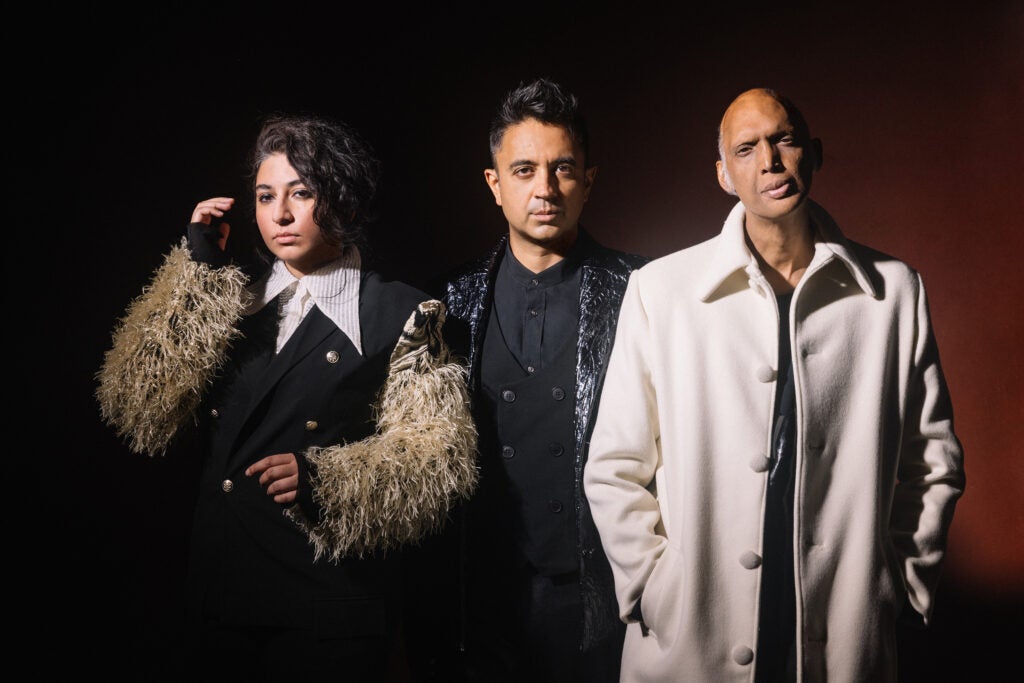‘It was like the music came from nowhere and revealed itself to us’
Harvard Professor Vijay Iyer reflects on his Grammy-nominated trio’s ‘mystical’ start

Stephanie Mitchell/Harvard Staff Photographer
Vijay Iyer remembers the moment when his trio’s Grammy-nominated song was born in a New York recording studio. It started as a repeating figure that Iyer played on the piano. Multi-instrumentalist Shahzad Ismaily joined with a bass line, providing a counterpoint to Iyer’s notes. When Pakistani singer Arooj Aftab entered with a serene Urdu vocal melody, Iyer said, it sounded as if the piece “already existed before it happened.”
“I remember the moment of creation and feeling like it came from nowhere, or just came through somehow and emerged, fully formed,” said Iyer, Franklin D. and Florence Rosenblatt Professor of the Arts. “Everything just felt right as it happened.”
Iyer’s work with Ismaily and Aftab is nominated for the 66th Annual Grammy Awards in two categories this year. Their 2023 album “Love in Exile” is nominated for Best Alternative Jazz Album, while “Shadow Forces,” the third track on the album, is nominated for Best Global Music Performance. Iyer plans to attend the Los Angeles ceremony on Sunday.
“It’s validating in a lot of ways,” said Iyer, who teaches in the Department of Music and the Department of African and African American Studies in FAS. “It’s mostly artists doing the voting. Often, for artists, the response comes from critics or from audiences and not always from each other, so that’s nice.”
The Recording Academy added the category Best Alternative Jazz Album this year to acknowledge a more diverse array of artists and keep up with the ever-shifting musical landscape.
“There’s so much diversity under this umbrella category of ‘jazz,’” Iyer said. “Some things I do aren’t considered part of that category, and this project might have been one of them. To have it re-enter the category is interesting to me, and exciting.”
Iyer’s collaboration with Aftab and Ismaily dates to 2018 when the trio played what they thought would be a one-off gig at The Kitchen, a venue in New York City. But their music meshed so well it left all three in awe, Iyer said.
“We just sort of stumbled on stage and played this mysterious, 25-minute set — we didn’t really know what to expect,” Iyer recalled. “It rewarded us much more than we expected, in a way that we felt really moved by. It was like the music came from nowhere and revealed itself to us. It was a mystical experience, I think it’s fair to say.”

Iyer (center) with Arooj Aftab and Shahzad Ismaily.
Photo by Ebru Yildiz
“Each time we perform it is really without a plan.”
When recording “Love in Exile” in late 2019, Iyer said, they sought to capture the same spontaneity as that first show.
“Each time we perform it is really without a plan, but instead with a commitment to that process and that set of relations and that kind of affective intensity,” Iyer said. “That’s how we made the record, in the same way that we have played all of our concerts. We just begin the process anew.”
Much of the trio’s music is created live. Iyer, who is teaching an advanced ensemble workshop this semester for composer-performer-improvisers, prefers to call it “live composing” rather than “improvisation.”
“The term ‘improvisation’ often suggests to the reader that the music is not serious, not detailed, not engaged, not perfect,” Iyer said. “To say that this is ‘live composition’ is to say that we are creating structure and form and acting with intention and collectively authoring something as it happens.”
Iyer will fly to the Grammy ceremony straight from a run of shows at the Village Vanguard in New York City for the release of his newest album, “Compassion,” with bassist Linda May Han Oh and drummer Tyshawn Sorey. He recalled the excitement of the last time he attended the event, back in 2010.
“You’re in a room full of musicians of all kinds, Indigenous musicians, country-western folks, classical musicians, and hip-hop artists, but what they all have in common is that they’re passionate about music. It’s pretty extraordinary to be in a room of thousands of people like that.”




